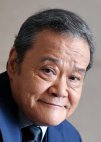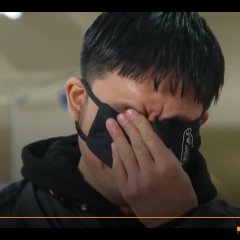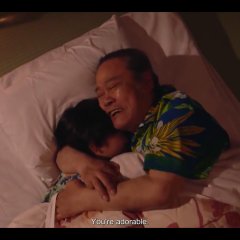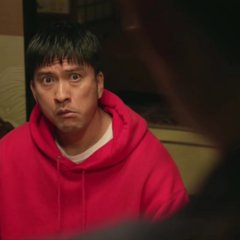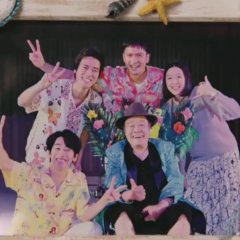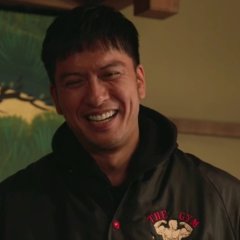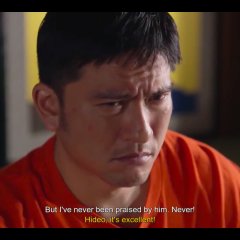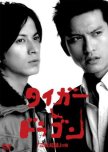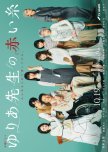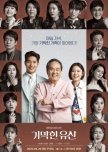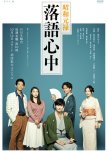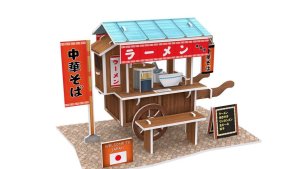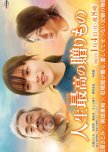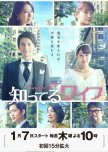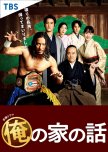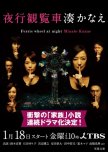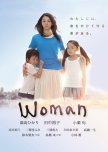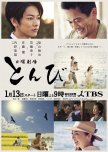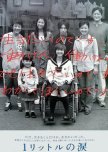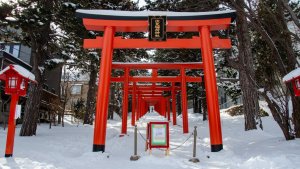 Japanese 2021 Winter Drama Season December - February
Japanese 2021 Winter Drama Season December - February O lutador em decadência Juichi descobre que o pai está em estado crítico e corre para o hospital, onde acaba tendo uma desconfortável reunião de família. (Fonte: Netflix) Editar Tradução
- Português (Brasil)
- Arabic
- English
- magyar / magyar nyelv
- Título original: 俺の家の話
- Também conhecido como: My House Story , A História da Minha Casa , The Story of My House , Story of My Family!!! , Ore no Ie no Hanashi
- Roteirista: Kudo Kankuro
- Diretor: Yamamuro Daisuke, Kaneko Fuminori, Fukuda Ryosuke
- Gêneros: Comédia, Vida, Drama, Família
Onde assistir Minha Família, Minha Luta
Subscription (sub)
Elenco e Créditos
- Nagase TomoyaMiyama JuichiPapel Principal
- Toda ErikaShida SakuraPapel Principal
- Nishida ToshiyukiMiyama Jusaburo / "Juju"Papel Secundário
- Nagayama KentoMiyama Yosuke [Juichi's younger brother]Papel Secundário
- Eguchi NorikoMiyama Mai [Juichi's younger sister]Papel Secundário
- Kiritani KentaMiyama Jugemu [Juichi's adopted brother]Papel Secundário
Resenhas

I have got nothing but "splendid" to say about "Ore no Ie no Hanashi".
Well, not really nothing (just quoting Juichi), I have got lots to say about this dorama and will try my best to not include spoilers.Kudo sensei said in an interview that he wanted to make a story about inheritance issues in Japanese traditional art families. The story synopsis may not sound that spectacular. In fact, you might even expect it to be kind of light-hearted, comedic dorama, considering that it's Kudo x Nagase dorama but "Ore Ie" is a lot more than that. Personally, I think the whole COVID-19 thing also somehow influenced Kudo-san's writing too (I'll just stop here to avoid spoilers but those who completed may probably sense the same).
As you ride alongside the Miyama family, you begin to notice that "Ore Ie" is quite different, unique among Kudo's works. I really learned to love and embrace all the good and bad things of the characters. From what I have observed, it is not exaggerated in profiling Ju Ju's character since several renowned traditional arts performer do have more or less similar lifestyle as Ju Ju. After all, even the "Living National Treasure" is still a human being who is as flawed as me or you (well, maybe more than most of us). The whole story subtly portrayed what and why family matters to each and everyone of us, by highlighting many things that we may not think of, forgot or taken for granted and failed to prepare ourselves for our own families when the thing(s) that matter comes (i.e., parents' health and well-being; finding and giving what is best for your children; inheritance, etc.).
On acting, I could not ask for more from the whole cast for the effort they put in. Of all the cast, only Nishida Toshiyuki had a formal training of Noh in the early years of his career (that's why the way he sings is so composed) by an acclaimed Noh actor, Kanze Hisao, who was an influential figure in renaissance of Noh in post-war Japan. He was dubbed as "Zeami of Showa", so in a way, many elements of this dorama also serve as a tribute to him.
Of course, Nagase Tomoya is the one who deserves the most of the credit, applauds for his preparation and performance for mastering all these things about pro-wrestling and Noh. Personally, I recognized Nagase san as a good actor (esp. in comedic roles) though not really was a big fan of him, but his portrayal of Juichi did elevate my opinion of him. Nishida Toshiyuki, Kiritani Kenta, Eguchi Noriko, Nagayama Kento, and the queen, Toda Erika, all delivered what is expected of, with a great chemistry between them. The child actor who played as Hideo also deserves a special mention like all other big names in this dorama.
Here is a brief take on music and re-watch value. Since, the story is about the family and the way it is made, you can always enjoy the story while learning a thing or two from re-watch. OST is not quite standout though I really love the tunes used for some heavy moments (Track no. 3 and 18 from OST). Oh, and Takessy's songs from episode 6 are also entertaining.
"Guilt; Gratitude; Grandeur" is the three words that best describe the theme of this dorama. Being Kudo san's latest work with his usual staff and cast alone is a huge attraction to their longtime fans. Another plus thing is that this dorama, in a way is a tribute to Nagase Tomoya on his journey with TOKIO and Johnny's (a must watch for his fans, as my friend "Coriander" commented). I would not say "Ore Ie" as a go-to dorama for someone new to Japanese culture, but it is definitely a must watch if you are a massive fan of Kudo x Nagase or love a good story about a family.
Esta resenha foi útil para você?

Makes you reflect about different sides of life before judging.
This drama might remind many j-dorama watchers of an older drama "Tiger and Dragon". The reason is, both are written by Kudo Kankuro, lead by Nagase Tomoya playing a character learning an old art from a character played by the legendary Nishida Toshiyuki. Both dramas use this opportunity to teach about Japanese culture and demonstrate how this art still has an influence on our modern society and should be preserved. Also, I have to say, the combination of those three is GOLD. Kudo-Sensei knows how to use all the potential of both actors, who have some of the best on-screen chemistry.This story was very simple yet very elaborated. As I watch each episode, I find myself pondering about different topics. Even re-evaluating previous judgments. It's not really about the story, but how it presents day-to-day life. The moments AFTER the great gestures and talk of sacrifice, the moments after making the promise to change, take up a new responsibility, or give up something deemed a waste of time. Those moments are very real. Those are the moments we rarely see on screen. They lack the theatrical needed to emphasize certain actions or characters, yet they are the most real and hit much closer to home.
It's easy to say that children should take care of their elder parents, and hail the nurses that do the job instead of said children. But we forget that sometimes it's just not feasible. Nurses are paid to do that job, while the children need to earn a living WHILE taking care of their elders. This can be stressful and cause anxiety to all parties involved. However, that doesn't mean that children should just leave it to professionals. Just like there was a time their parents couldn't be replaceable, as adults, there are things only THEY can do for their parents.
Another thing related to this subject reflected in this drama is the complicated emotions that come with such responsibility. The family issues can be perceived as particular to this story, yet they are more of standard in our society today. We don't hold our parents at a height where we don't question their actions anymore, but we forget all the sacrifices our parents made and the difficulties they went through, just to give us a better life than they had. However, as outsiders looking in, it's easy to think "why are those children treating their elderly parents this way" without knowing the hardships said parents are presently causing, nor the traumas they inadvertently caused. Because they are all flawed humans.
Although touched upon lightly, the complications of marriage, the cause of divorce, and the consequences were beautifully portrayed. The road of a crush turning into a relationship, the relationship turning into the mundane everyday life, etc.
Those were just some of the topics explored masterfully in this drama.
The characters in this drama were both extraordinary and very ordinary. Depending on where you are in life, each character felt very authentic. Very early on I felt that Juichi is ME. At least, at my current stage in life. I haven't seen Nagase Tomoya in better shape (looks AND skills), he was lovely, annoying, cute, and dumb. His sister Mai is probably these in every household. She's the one most depended on yet most ignored. She's sensitive and very sensible to those around her. They couldn't have cast anyone better than Eguchi Noriko. In subtly manners, she made the character glow. The father/grandfather played by is probably the most present character in our lives. Annoys us, makes us laugh, roll our eyes, cry. No one other than Nishida Toshiyuki could have done it. The forever baby brother, the black sheep, the middle child, all are present. The relationship between each character and its growth felt very authentic. I loved how Juichi saw himself not in his son but in his nephew and went out of his way to stand by him in ways no one did in his time. That generational difference is palpable.
As far as storytelling goes, the drama uses foreshadowing with the use of Noh, as well well as hints in the narration. I didn't pay attention at first and got caught by a few surprises. However, couldn't fault the story as I recalled the foreshadowing. In this end, it's the type of story that you will accept love no matter the direction it takes. It'll make you laugh out loud, it'll make you cry, it'll make you frustrated, but mostly it'll entertain you.
If I talk about drawbacks. Although as individuals I love their characters, I didn't feel the chemistry between Nagase Tomoya and Toda Erika.
There is just too much to say about this drama, I don't know where to stop so I will stop here. Everyone should just go watch it. Believe me, you won't regret it. The biggest downside is that the drama eventually comes to an end while you still want to see more of the Miyama family. I miss them so much T_T
Esta resenha foi útil para você?





